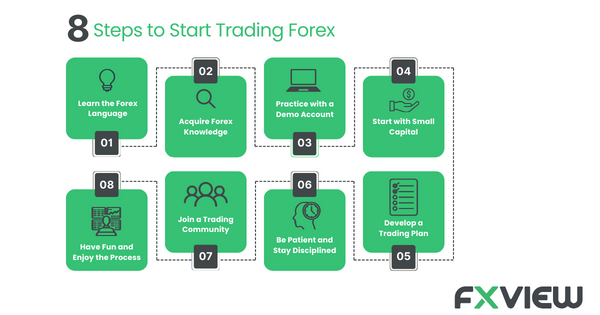
Start Forex Trading: 8 Essential Steps
Are you ready to venture into the exciting world of forex trading? Discover essential tips that will empower and guide you through the intricate forex markets. From deciphering the forex language to mastering risk management, let’s embark on this journey together.

Steps to start Forex Trading
- Learn the Forex Language
Forex has its own unique language, like pips, lots, margin, and leverage. Take the time to familiarize yourself with the jargon and understand the basics of how the forex market works. Just think of it like you are learning a new language.
- Get Educated
Knowledge is power in forex trading. There are so many educational resources available, including webinars, tutorials, online courses, and much more. Arm yourself with the right knowledge and skills to make informed trading decisions.
- Practice with a Demo Account
Before going live trading, keep on practicing with a demo account. Most forex brokers offer demo accounts that allow you to trade with virtual money (basically you lose nothing!) in real market conditions. This may help you to hone such skills, test your strategy, and gain confidence before you plan on trading with real money.
- Start with Small Capital
Just like dipping your toes in the water before diving in, you can start with a small trading account and trade with a manageable amount of capital. That way, you may be able to gain some experience, learn from mistakes, and ultimately refine your trading strategy.
- Develop a Trading Plan
Think of a trading plan as a roadmap that guides your trading decisions. It should outline your trading goals, risk management strategy, and trading rules. Having a sound plan in place could help you not only to stay disciplined but also focused, and potentially increase your chances of success in the long run.
- Be Patient and Stay Disciplined
Forex trading requires patience and discipline. Don’t expect overnight success or let emotions drive your trading decisions. Remember to stick with your trading plan, manage your risks, and stay patient especially when you are faced with tough challenges. Like they said, Rome wasn’t built in a day!
- Join a Trading Community
Trading can be seen as a solitary activity, but it doesn’t have to be! Plus joining a trading community can not just provide you with support, and insights, but also you can get to have camaraderie with fellow traders. Learn from each other, share ideas, and even make new friends who share the same passion for trading. However, keep in mind that no matter what anyone says, you are the only one responsible for assisting with any gathered information and eventually making informed decisions to start forex trading.
- Have Fun and Enjoy the Process
Forex trading can be intense, but don’t forget to have fun and enjoy the process! Embrace the learning curve, celebrate the win, acknowledge the losses and finally, keep that positive attitude. Keep in mind that trading is a journey and not a destination, so enjoy the ride.
Key Takeaways
- Learn forex jargon and basics to understand the market language to start forex trading.
- Knowledge is power; use educational resources to make informed decisions.
- Practice with a demo account before trading real money.
- Start with a small account, learn from your mistakes, and refine your strategy.
- Develop a trading plan for goals and risk management.
- Patience and discipline are vital; avoid emotional trading.
- Join a trading community for support and insights.
- Enjoy the learning journey and maintain a positive attitude.
- Understand risks and use proper risk management techniques.
Conclusion
Prepare for forex trading by learning its language, gaining knowledge, practising with a demo account, starting small, and developing a trading plan, then start forex trading. Be patient, join a community, enjoy the process, and understand the risks. Success comes with learning, experience, and effective risk management.
Disclaimer: The information contained in this article is provided for educational and informational purposes only and it is not intended to be, nor does it constitute financial, investment or trading advice. You should not make any financial, investment or trading decision based on the information provided in this article without performing your own research or seeking advice from an independent advisor.



